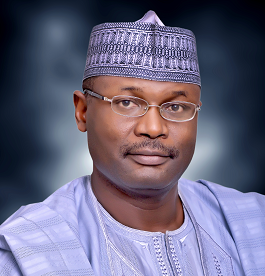The Chairman of the Independent National Electoral Commission (INEC), Prof. Mahmood Yakubu, has stated that the Commission would require approximately N126 billion to fund its activities in 2025 and commence preparations for the 2027 general elections.
Yakubu made this known at the National Assembly Complex while defending the 2025 budget proposal before the Joint Committee on Electoral Matters.
According to him, the N40 billion allocated for INEC in the 2025 budget proposal by President Bola Tinubu is insufficient, especially considering the payment of salaries and allowances, which have increased due to the recent adjustment in the minimum wage.
He explained that in 2024, INEC was allocated the same N40 billion, which only covered salaries and some social contributions such as NHIS contributions, pensions, and ITF, among others.
“We complained about the allocation and were asked what we thought would be adequate. We proposed N80 billion at the time. Although efforts were made to increase the allocation, they were unsuccessful.
“On our part, we approached the executive for additional funds and managed to secure about N10.5 billion to cover the Edo and Ondo governorship elections.
This allowed us to conduct those elections successfully,” Yakubu said.
He described 2025 as a critical year, noting, “We have the Anambra governorship election later in the year, but no provision for its preparation is included in the budget.
“We must also prepare for the Area Council elections scheduled for February 2026, and there is no allocation for this in the current budget. Additionally, monitoring party primaries, conducting bye-elections, and starting preparations for the 2027 general elections are all unfunded.
“We have not commenced the continuous voter registration exercise due to a lack of funds.
This exercise must start this year and conclude in 2026. Furthermore, redistributing voters to polling units from overcrowded areas is necessary, and these activities require funding, which has not been accounted for in this budget.”
Yakubu highlighted that INEC has about 11 bye-elections to conduct this year due to vacancies in the National and State Houses of Assembly caused by deaths or resignations.
While the Commission has secured N500 million from the government for this purpose, he stressed that the amount is insufficient to cover the costs.
He further lamented that despite the inflationary trends in the country, the Commission continues to receive the same N40 billion allocation without adjustments for increased wage bills.
Yakubu stated, “INEC currently employs over 14,700 staff members, excluding political appointees affiliated with the Commission.
These appointees include the chairman, 12 national commissioners, 37 resident electoral commissioners, and their aides, who all draw salaries and allowances from the Commission’s budget.”
He also revealed that INEC has over 850 buildings nationwide in need of renovation, along with offices in 8,809 wards, 774 local governments, 36 states, and the Federal Capital Territory.
Additionally, Yakubu disclosed plans to relocate 59 local government offices currently housed in inadequate facilities, with a target of relocating at least 30 in 2025, provided the N126 billion budget proposal is approved.
The Commission also aims to replace key equipment such as BVAS machines and voting cubicles. Yakubu noted that since the 2023 general election, INEC has lost about 440 BVAS machines, although an insurance premium of N205 million has been recovered for the damaged machines.
He clarified, however, that the insurance funds were paid directly to government coffers and not to INEC.
Reacting to the presentation, Senator Ireti Kingibe (LP, FCT) urged the National Assembly to prioritize adequate funding for INEC to ensure its independence and effectiveness.
“INEC must be independent, and we must provide the necessary funding to enable it to carry out its responsibilities. It’s not a question of whether they should get the money—they must get it,” she emphasized.
Similarly, a member of the House of Representatives, Adeboye Paul, warned about the dangers of underfunding INEC, saying, “The current system is risky. When there is a shortfall, local governments often step in to provide supplementary funding, which undermines the electoral process.
“If budget defense does not lead to meaningful input, why do we engage in this exercise? Last year, we faced a similar situation and made efforts to increase the allocation, but to no avail. We must find a way to support the Commission and safeguard our democracy. INEC should not have to repeatedly approach the executive for funds—it’s detrimental to democracy.”
The budget defense session later moved into a closed-door meeting with the INEC Chairman, seven national commissioners, and directors in attendance.

